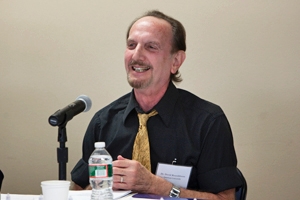Government & Politics
Prof. Rosenbloom Testifies in Senate on Strategies for Government Reorganization

Distinguished Professor David H. Rosenbloom recently testified in front of the Committee with Task Force on Government Performance. The hearing examined effective strategies for government reorganization, focusing on reducing fragmentation, overlap, and duplication and achieving cost savings. In addition to Rosenbloom others testifying included Gene L. Dodaro, Comptroller General of the United States, Government Accountability Office; John P. Holdren, Director, Office of Science and Technology Policy, Executive Office of the President; Delaware State Senator Nicole Poore.
At its invitation, I testified before the Task Force on Government Performance of the U.S. Senate Committee on the Budget on May 16 (program attached). The title of the hearing was “Silo Busting: Effective Strategies for Government Reorganization.” During the Q&A my point that the Inspectors General and the Government Accountability Office are largely retrospective, offering correctives for waste, fraud, and abuse, gained acceptance. In the testimony and Q&A I offered the idea that each major agency should have a Chief Productivity Officer who would be forward looking with respect to continuous innovation, organizational process reengineering, the application of new knowledge to managerial technique and technology as warranted, and the integration intra-agency programs, including those promoting democratic-constitutionalism such as freedom of information. I distinguished the Chief Productivity Officer from Chief Operating Officers and Performance Improvement Offices under the Government Performance and Results Modernization Act (2010) on the basis that the COO and PIO are likely to be focused on implementing agency strategic plans and developing performance reports, as required by the statute. I believe the testimony and Q&A went quite well.
The Senate Committee Task Force’s invitation was based on the impact that one of my books, Building a Legislative Centered Public Administration: Congress and the Administrative State, 1946-1999 (University of Alabama Press, 2000), had on a member of the Budget Committee staff. The research for the book was first presented as “1946: Framing a Lasting Congressional Response to the Administrative State," in the John Joseph Boyne Distinguished Lecture Series, University of Alabama (Maxwell Air Force Base), Montgomery, AL, September 14-17, 1998. In addition to being the source of my testimony, as requested by the Committee on the Budget Task Force, it has been cited in several Congressional Research Service reports, which has led to a few media interviews, including one with USA Today.
To me it is interesting is that this basic piece of qualitative historical scholarship on Congress’ 1946 framework for treating federal agencies as its adjuncts for legislative functions such as rulemaking, regulating their use of delegated legislative authority, and supervising them, as embodied in the Administrative Procedure Act, the Legislative Reorganization Act, and the Employment Act, among other measures, is having an impact on Congressional Research Service reports and U.S. senators. The research involved turning more than 16,000 pages of the Congressional Record for 1946 and part of 1945. The book was neither written on a contemporary policy topic nor externally or internally funded or supported by a course buy-out or release. It received the 2001 National Academy of Public Administration Brownlow Book Award, arguably the most prestigious such award in the field of public administration (nominated by now AU President Kerwin), deals with a large, fundamental question—“what is Congress’ role in the federal administrative state”—and is written in language that English-speaking policymakers and researchers with knowledge of American national government can readily understand.
Among the senators present for all or part of the hearing were Kelly Ayotte (R-NH), Chris Coons (D-DE), Ron Johnson (R-WI), Patty Murray (D-WA), Jeff Sessions (R-AL), Mark Warner (D-VA), and Roger Wicker (R-MS).
